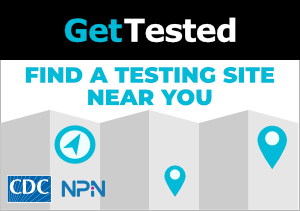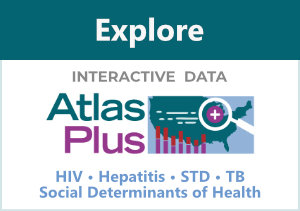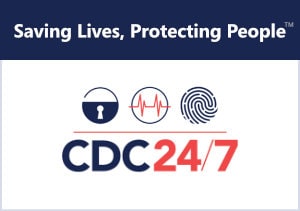Connections (November-December 2022)
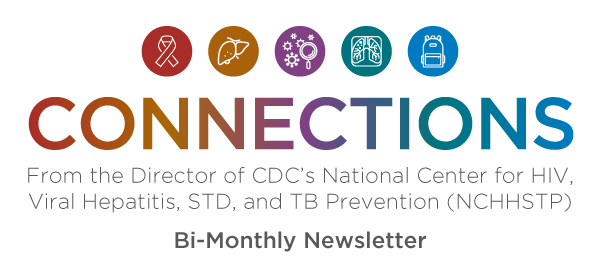
November- December 2022
From the Director - Jonathan Mermin, MD, MPH
Since early October, I’ve been working as the Incident Manager for CDC’s Monkeypox Response. The outbreak continues to decrease each week, and I am hopeful progress will continue. Many people from NCHHSTP and throughout the agency have dedicated their skill, acumen, and time to ending the outbreak.
Case count data indicate that incidence is decreasing. However, we continue to see heartbreaking health outcomes for those who are immunocompromised, especially for those with HIV-associated immune compromise, as reported in a recent MMWR. From the onset of the outbreak it has disproportionately affected persons with HIV, gay, bisexual, and other men who have sex with men, and transgender women, especially African Americans and Hispanic/Latinos. These communities responded with rapid action, as did CDC and partners, ensuring health information, testing, and treatment were available to those who need it, and focusing vaccine strategies that would decrease health disparities. Those of us who work in HIV and STIs are situated well to ensconce monkeypox work into our day-to-day public health and clinical activities.
We have been highlighting the racial/ethnic disparities in monkeypox incidence and vaccine administration and integrating health equity approaches into the response. The Vaccine Equity Pilot Program is one example of work we’re doing to bridge those complementary needs.
I’ll be back with another update in January. I’m also excited to pilot being the first CDC Incident Manager on social media. A few times a week, I am providing information and updates about the work of the response. Please follow along with me @DrMerminCDC on Twitter.
Recent hepatitis A outbreaks mark a shift in hepatitis A virus (HAV) infection epidemiology in the United States. Whereas HAV transmission was previously associated with international travel and exposure to foodborne outbreaks, drug use (both injection and noninjection) was the predominant risk factor associated with HAV transmission during recent outbreaks. An article published in CDC’s Morbidity and Mortality Weekly Report (MMWR) describes widespread hepatitis A outbreaks associated with person-to-person transmission during 2016–2020. Despite long-standing vaccine recommendations, many adults at increased risk for HAV infection remain vulnerable to infection.
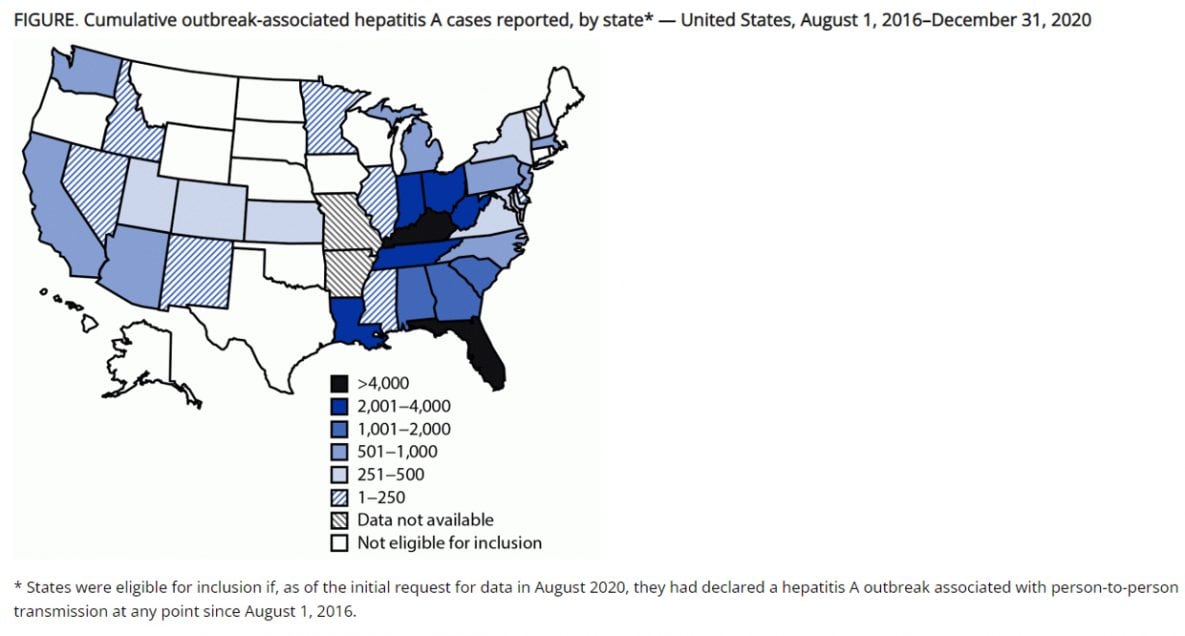
Summary Sources
- Foster MA, Hofmeister MG, Yin S, Montgomery MP, Weng MK, Eckert M, Nelson NP, Mermin J, Wester C, Teshale EH, Gupta N, Cooley LA; Hepatitis A Response Team. Widespread hepatitis A outbreaks associated with person-to-person transmission—United States, 2016–2020. MMWR Morb Mortal Wkly Rep 2022;71(39):1229–34.
Response Headlines
CDC expands updated COVID-19 vaccines to include children ages 5 through 11. Read CDC’s media statement.
CDC Allows Novavax Monovalent COVID-19 Boosters for Adults Ages 18 and Older. Read CDC’s media statement.
CDC’s Division of Adolescent and School Health’s (DASH) New Success Stories
DASH has published new success stories that show what schools are doing to implement health education, provide health services, and create safe and supportive environments for students. Read the stories on the Healthy Youth website.
CDC’s Division HIV Prevention (DHP)’s Strategic Plan Supplement
DHP launched its 2022-2025 Strategic Plan Supplement, which builds on the existing goals, objectives, strategies, and indicators in DHP’s 2017-2020 Strategic Plan, by outlining updated priorities that will equip DHP and its implementing partners with the tools they need to achieve national HIV prevention goals.
Medscape Commentary: STI Treatment Guidelines
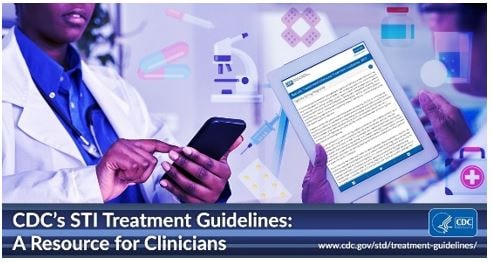
In a new Medscape Commentary by Drs. Laura Bachmann, Laura Quilter, and Kim Workowski, CDC’s Division of STD Prevention (DSTDP) experts highlight five key things to know about the 2021 STI Treatment Guidelines. The full STI Treatment Guidelines, as well as several healthcare provider resources, including the mobile app, are available from the website.
New Youth Advisory Councils pages
In support of its school connectedness work, CDC’s Division of Adolescent and School Health (DASH) recently released new web pages focused on Youth Advisory Councils (YACs). YACs comprise a body of diverse youth striving to vocalize the health needs of adolescents by serving as youth ambassadors, and who are engaged in planning and implementing projects to address structural barriers to health in their schools and communities. Through YACs, schools can offer opportunities for youth to learn and demonstrate engagement, leadership, and connectedness—all of which are important in reducing adolescent health risks and experiences.
New Let’s Stop HIV Together Resources for Consumers
Together U video series launch
Together U is a three- part animated video series set on a college campus that features college-aged students as they navigate getting an HIV test, advocating for HIV and other STI prevention options, and adhering to HIV treatment while juggling school. The first video in the Together U series just launched!
Three new social media toolkits
There are three new additions to the social media toolkits.
- The new HIV treatment toolkit features ready to go content and sample copy in both English and Spanish that aims to reach people where they are regarding HIV treatment.
- The new prevention toolkit covers all HIV prevention options, including testing, pre-exposure prophylaxis (PrEP), treatment, and stigma.
- Lastly the new GIPHY Sticker Toolkit shows users how to add Together GIPHY stickers to Facebook and Instagram stories.
New Let’s Stop HIV Together Resources for Providers
The guides on PrEP have information for providers about how to determine if PrEP should be prescribed to their patients as well as guidance for prescribing oral and injectable PrEP. The new Quick Guide focuses on helping clinicians broach the topic of sexual health with their patients.
Syphilis Surveillance Supplemental Slides, 2016-2020

CDC’s Division of STD Prevention (DSTDP) recently released Syphilis Surveillance Supplemental Slides, 2016–2020. The slides provide trends in surveillance data on selected reported behaviors among primary and secondary syphilis in the United States during 2016-2020, stratified by region, race/Hispanic ethnicity, and sex and sex of sex partners.
Dr. Leandro Mena, Division of STD Prevention (DSTDP) Director, Interviews with PopHealth Week and STIIX and Stone Podcasts

Check out the latest podcasts from PopHealth Week and STIIX and Stones, which feature Dr. Leandro Mena. He discusses a variety of topics, including the current state of STDs, challenges STD programs face, the impact of the COVID-19 pandemic, and CDC’s initiatives to address STDs.
Overview of Notice of Funding Opportunity (NOFO): Advancing Policy as a Public Health Intervention to Reduce Morbidity, Mortality and Disparities in HIV, Viral Hepatitis, STDs, and Tuberculosis; PS-23-0009
This NOFO provides funding to conduct robust policy surveillance and legal mapping of priority and emerging policy levers, including cross-cutting syndemic topics (e.g., social determinants of health, infectious disease consequences of the opioid crisis, safe and supportive school environments, and other health conditions).
Updates to School Connectedness web pages
CDC’s Division of Adolescent and School Health (DASH) recently updated pages on the benefits of school connectedness. School connectedness is a sense of being cared for, being supported, and belonging at school. Youth who reported feeling more connected at school during the pandemic were less likely to report poor mental health. The updated pages can be found on the DASH Healthy Youth website.
National Prevention Information Network

NPIN representatives recently had a chance to educate over 3,000 attendees at the HIV/AIDS (USCHA), held October 8-11 in San Juan, Puerto Rico. The attendees include professionals working in HIV prevention, testing, and the treatment spectrum. NPIN’s focus was to educate public health partners about five key NPIN resources:
- NPIN’s testing/provider database – using our search tools to find testing services and healthcare providers
- Widgets – small apps that partners can embed in their websites to provide their community access to our testing and provider tools
- Funding and materials database – a searchable catalog of funding opportunities, health education materials, and communication products
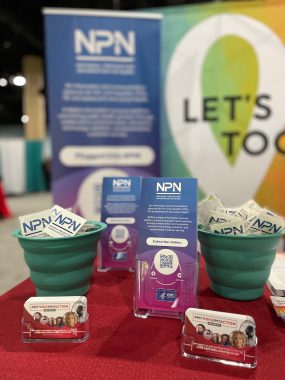
- NPIN Community – secure online space to connect, share, and collaborate on NCHHSTP health topics
- NPIN News – our monthly newsletter highlighting new resources, communication products, and recent additions to our databases
Hearing from NPIN’s partners firsthand—particularly community-based organizations—about the challenges they face when working to reach at-risk communities, engage people in testing services, and link individuals to care was extremely beneficial. NPIN now has invaluable insights on they can grow to meet their evolving needs.
Also, be sure to check out the latest issue of NPIN News.
CDC participated in the 2022 STD Prevention Conference Sept. 19-22, following the release of preliminary 2021 STD Surveillance Data. Before and during the conference, CDC’s DSTDP director, Dr. Leandro Mena, participated in media interviews about his STD Conference opening plenary remarks. Messages focused on preliminary 2021 STD data, drivers of the STI Epidemic, current barriers to sexual health services, and innovative STD prevention and testing methods for the future. Media covered it widely, including:
- ‘Out of control’ STD situation prompts call for changes | AP News
- New CDC data: STD rates shot up in 2021 | Politico
- Experts Are Warning About an “Out of Control” Rise in Sexually Transmitted Infections | Them
- CDC: STD Epidemic Is “Out Of Control,” With Syphilis, HIV On The Rise | The Shade Room
- Rise in STDs Lead to Calls for Prevention and Treatment Changes | CNBC
- STDs are on the rise, according to CDC data | Fortune
- America’s STD Problem Is ‘Out of Control,’ Say Experts | Gizmodo
To get the latest news and announcements from our Center, check out the NCHHSTP newsroom.
Dr. Jonathan Mermin
@DrMerminCDC
- U.S. Antibiotic Awareness Week is November 18-24
U.S. Antibiotic Awareness Week is an annual observance that raises awareness of the threat of antibiotic resistance and the importance of appropriate antibiotic use - World AIDS Day
World AIDS Day is December 1. - #She’sWell Health Literacy Training Webinar is December 8
CDC will host a training webinar to discuss social marketing for behavior change and health literacy in the context of the #ShesWell campaign. Register today.
- March 10: National Women and Girls HIV/AIDS Awareness Day
- March 20: National Native HIV/AIDS Awareness Day
- March 24: World TB Day
- April 10: National Youth HIV/AIDS Awareness Day
- April 18: National Transgender HIV Testing Day

Mary Cashin
Do you have feedback, story ideas, content you would like to see in the newsletter? Contact us
Get Connections. Your more interesting inbox awaits!
Subscribe now




